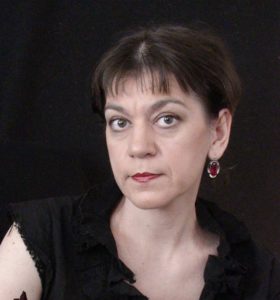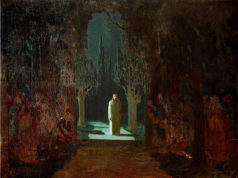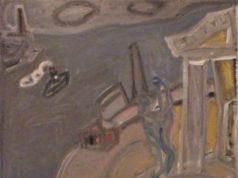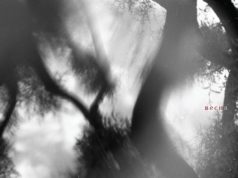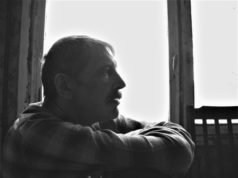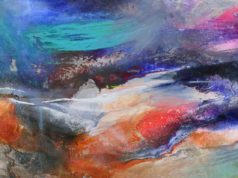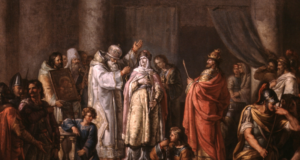Tatyana Ivanovna Kovalkova (St. Petersburg) — journalist. Born in 1964 in Leningrad. She graduated from the Faculty of Journalism of LSU in 1988. Research topic: human rights and literary and philosophical self-published journals of the 1970s and 80s. An active participant in the youth movement for the ecology of culture during the Perestroika period. She married Petersburg poet Oleg Okhapkin in 1989. She worked in the newspaper “Evening Leningrad”, on the Leningrad television, VGTRK “Petersburg”, “Culture”. She is a member of the International Association “Russian Culture” since 2007 til now. Founder of the Ohapkinsky Readings and eponymous almanac.
These two poets do not appear to have much in common. Mikhail Sopin’s poetic manner is based on traditional Russian songs, while that of Oleg Okhapkin is framed by the classical tradition of versification. As a teenager, Sopin was scarred by the war, while Okhapkin was born at the end of the war and was endowed with a new vital force of the post-war generation. Sopin found his universities in prison and entered into literature when he was almost forty. At 23, Okhapkin was already one of the leaders of the Leningrad literary underground, a Bohemian and a welcome guest in the literary salons of both capitals. Still, there is a certain part of their poetry where the archetypal origin of the Russian character manifests itself so powerfully and eloquently that all initial differences are forgotten.
The first trait is a keen sense of justice, expressed through the sharpness and accuracy of the poetic utterance.
Mikhail Sopin:
The poor rally crucified: / “Protect / Shrines / From decay!” / And the words are as if sweet, / But in the mouth of the crowd -/is highest blasphemy. / Everything has been played back for a long time: / Parades / Banners, / Masks and shields … / Protect me from the decrepit truth, / I beg, God, / Protect. / I am drowning in human verbal rust, / Not a nomad / And not an eternal Jew: / My life belongs / Stainless, / My death belongs / Stainless, / What do I personally / Belongs?
Митингуют бедные распято: / «Защитим / Святыни / От распада!» / И слова как будто бы милы, / Но в устах толпы — / Венец хулы. / Всё давно отыграно: / Парады / Транспаранты, / Маски и щиты… / Защити меня от дряхлой правды, / Умоляю, Боже, / Защити. / Я тону в людской словесной ржави, / Не кочевник / И не вечный жид: / Жизнь моя принадлежит / Державе, / Смерть моя принадлежит / Державе, / Что же лично мне / Принадлежит?
With these, other lines resonate:
Tired with all these, for restful death I cry,
As, to behold desert a beggar born,
And needy nothing trimm’d in jollity,
And purest faith unhappily forsworn,
And gilded honour shamefully misplaced,
And maiden virtue rudely strumpeted,
And right perfection wrongfully disgraced,
And strength by limping sway disabled…
Sopin has a purely Shakespearean intonation. He is a Hamlet of the Soviet era, of its second most harsh period, and in this sense (as well as textually) is quite comparable with the third period Hamlet, Vladimir Vysotsky.
If, according to the Shakespearean coordinate system, Sopin is Hamlet, then Okhapkin is poor Yorick:
Are you really Asian? / No. You are Russian. / Bawdry attests it is/ Excellent cleanliness. / One witness temper / Humble and cool. / Turning yourself, / You will remember something. Wait! / … Yes, who are you? Bandit? / A tramp or a thief? — / Yes, I am Russian, rhymist. / I do not bark at the fence.
Неужто азиат? / Нет. Россиянин ты. / Тому свидетель мат / Отменной чистоты. / Тому свидетель нрав / Смиренный и крутой. / Себя перелистав, / Ты вспомнишь нечто. Стой! /…Да кто же ты? Бандит? / Бродяга или вор?- / Да русский я, пиит. / Не лаю на забор.
This well-known Okhapkin’s poem of 1969 reveals to us an image of a holy fool, a jester who, thanks to the allegorical manner of his jestering, preserves his truthful and powerful voice.
The lives of both poets are tragic and their life spans turned out to be quite long, for long-sufferance. As a child, Sopin went up to Potsdam with the advancing army. His experiences of that time, captured in verses much later, are a non-healing wound. The image of a child with a soul of an old man whom we still see in the mind’s eye after Andrei Tarkovsky’s “Ivan’s Childhood” was further developed in Mikhail Sopin’s works. We see what happened to the unnecessary, unattended children of war. At 20, he received his first prison term, and later second. In total, 16 years in camps.
Oleg Okhapkin, in addition to famine in post-war Leningrad, which he described in the poem “Golod” (Hunger), so far not found, had been oppressed by Soviet punitive psychiatry since when he was 40.
Of course, a crack-up occurred in both, despite their physical and mental strength. A crack-up, but not a breakdown. They both endured everything! Hence the laconic language and the aphoristic form of their civic poetry. A stereotype exists, prescribing that civic poetic texts shall be read as ideological ones. It developed in the Soviet era due to the interference of strict political censorship in the literary process. The part of Soviet intelligentsia, quite settled socially, took its lead from the Silver Age and therefore clearly disliked Nikolay Alekseyevich Nekrasov, the number one civic poet who was honoured not only by the Soviet government, but, completely independently, even by Dostoevsky! This is understandable. The self-centeredness of the creative personality of the Silver Age, its passion for mysticism and for playing life could not be combined with civic-mindedness that was understood as obsequiousness. Russian Silver Age is much broader than art nouveau and in the spiritual sense is quite comparable to some trends in European postmodernism. Only in emigration did Russian elite begin to colour its thoroughly anti-Soviet position with shades of civic-mindedness, although understood in different ways.
Approximately the same process took place in the inner emigration, which, for the above reasons, befell both M. Sopin and O. Okhapkin.
In fairness, it must be said that N.A. Nekrasov was rejected for no good reason, but not out of malice. The style of his poetic utterance reveals a prosperous man, a barin (lord), who, however, responds quite sincerely and ardently to the suffering of others. Only Dostoevsky could describe adequately the world that changed abruptly, thanks to his personal experience of suffering.
Both Okhapkin and Sopin have plenty of texts conveying their personal experience of suffering.
Here is the poem “V semye edinoy” (In a United Family) by Mikhail Sopin:
I’m scared: what if I force / All in being compassion to all alive? / I am complaining / To the White Field, / That my voice / Heards my mother: / «I am cold, mother, / I am cooling down. / Does my voice sound or not? ”/ Solemnly. Crowded. Desertedly. / No words, no sounds in response. / Russia, my dear, I’m getting cool. / Snowstorm in the weeds of past. / And drowning in the snow desert /My Farewell word. / Senselessly, slowly cooling down. / And there is no crowded end. / Complain /To the murdered / Son / On the fate of the Living father.
Мне страшно: а вдруг я неволю / Живущих живым сострадать? / Я жалуюсь / Белому полю, / Чтоб голос мой / Слышала мать: / «Мне холодно, мама, / Я стыну. / Мой голос звучит или нет?» / Торжественно. Людно. Пустынно. / Ни слова, ни звука в ответ. / Россия, родимая, стыну. / Метелит в бурьяне быльё. / И в снежную тонет пустыню / Прощальное / Слово моё. / Бессмысленно-медленно стыну. / И нет многолюдью конца. / Убитому / Жалуюсь / Сыну / На участь Живого отца.
There are also other powerful texts, such as “Zhivya v narode, ne byl ya narodom…” (Living Among the Folk I Was Not the Folk), “Govorila, pomnyu, mama” (I Remember, Mother Used to Say).
And this is Oleg Okhapkin’s experience. The ending of the 1970 poem “K moyey dushe” (To My Soul):
А ещё, и эта мысль страшнее могилы,
Мать-старуха жива… Хватит ли ей силы
Схоронить меня, когда, душа, к Богу в руки
Попадёшь, не дотерпев распятия муки…
Гордость твоя, христианин, дух мой полунищий,
Не гордыня – горечь всех, живых твоей пищей.
А посему будь честна, душа моя, пой же
И на кресте, пусть одна, зато боли больше.
Many shades of this thought can be found in the poems “Blagodarstvennaya molitva na zhizn’ gryadushchuyu” (A Thanksgiving Prayer for the Coming Life) and “Tyazhelye krylya” (Heavy Wings) as well as in many others.
It’s amazing to see which conclusions are drawn by both poets from their personal experience of suffering. More precisely, their unanimity therein is striking, without a single hint of condemnation, bitterness, vengefulness. They don’t ask who is to blame and what is to be done. Personal suffering makes their soul sensitive to the pain of others, compassionate.
Here are the lines of Sopin:
I — / Unsteadiness of snowdrifts, / Roll of a hot wave. / I — / Children’s shoes / On the dead roads of war. / I — / Camp of weary / In torture chamber / In mine dust / I — / Cry of the unborn / In crushed / Womb / Earth.
Я – / Зыбкость сугробов, / Накат раскалённой волны. / Я – / Детская обувь / На мёртвых дорогах войны. /Я – / Стан измождённых / В застенках / В рудничной пыли / Я – / Вопль нерождённых / В раздавленном / Чреве / Земли.
And this is Okhapkin. The ending of the long 1970 poem “Iz gostey” (Back Home After a Visit):
Я вспомнил злобные тела — / Друзья по всем приметам… / И, одинокий, у стола, / Слегка зевнул при этом. / И ни с того, и ни с сего / Захохотал невольно. / Любить? Зачем? За что? Кого?… / – Да всех. Затем что больно.
And again Mikhail Sopin, as if drawing a bottom line:
Приходят боли, / Отступают позы: / Друзья, борьба, / Анафема и гимн. / Сжигают сердце / Невидимки-слёзы / Не за себя – / От жалости к другим… / Желаю вам не маяться виною, / Что я тюрьмою / И войной пропах. / Мой близкий – / Одиночество земное / Со скепсисом улыбки / На губах.
Given their biographies, it is impossible to fault these authors for affectedness and call their poetic utterance a figurative way of speech. This is a calm, almost documentary sharing of experience.
So, personal suffering does not break a person but generates compassion. This is a purely Russian trait, or rather, the best trait of the Russian character. It is the capacity for compassion that gives way to forgiveness.
Sopin writes:
За всё, что выстрадал / Когда-то, / За всё, чего понять не мог – / Две тени – / Зэка / И солдата – / Идут за мною / Вдоль дорог. / После боёв / Святых и правых / Молитву позднюю творю: / Следы моих сапог кровавых / Видны – / Носками / К алтарю. / Есть в запоздалом разговоре, / Есть смысл: / За каждый век и год, / Пока не выкричится в горе, / Пока не выплачется в горе, / Любя, душа не запоёт.
Oleg Okhapkin’s verses from the 1969 poem “Khudozhnik” (Artist), too, sound conciliatory:
Итак, в стихию времени войду,
Едва накат стиха со мною схлынет
В часы отлива, в роковом году
Когда страна сынов своих покинет…
Слух мыслящий имеет власть мгновенья.
Он – время, сам из времени и в нём —
Сосуд, среда, стихии содроганье,
Где прошлого с грядущим не сольём,
Но бытия найдём превозмоганье.
The experience described by poets is priceless. Both Sopin and Okhapkin are people in the true sense of the word, that is, whole persons, which means they have kept their purity. In the context of the coming panopticon, described brilliantly by Yuri Mamleev in his latest works, especially in the novel “Posle kontsa” (After the End), their example of standing in the truth is extremely relevant. Their thought is not torn apart by the Soviet/anti-Soviet dualism. It paves a new way, the third way which is deeply rooted in the tradition of Russian life (the song motives of many texts do testify to this, but this is another subject).
In political terms, this choice could well be called left-conservative. It’s not enough to “remove Lenin from the money.” Without an act of repentance, it is impossible to change the social structure, but for this, the society must feel like a people. But repentance is impossible without compassion. Such a conclusion was reached by these two true poets, for whom poetry was a part of the life that God gave. Their civic stance also lacks momentary political meanings. It is built on the concept of the Motherland, which in their works is clearly separated from the concept of the State. But it is important to emphasize that this distinction is made by men with state thinking.
On the headband: etching by Boris Frantsuzov “Summer Clouds”, 1990.
© Т.И.Ковалькова, 2014
© Альманах «Охапкинские чтения» №1, 2015
© Translated by Julia Zimarskaya/Englica LLC, 2019
© «Русcкая культура», 2019


